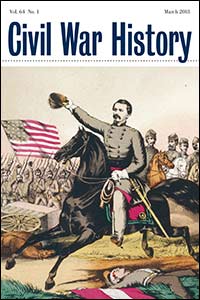March 2018, Volume 64, No. 1
Nov 30th, 2017McClellan’s Epidemic: Disease and Discord at Harrison’s Landing, July-August 1862
by: Zachery A. Fry
The Army of the Potomac that George McClellan led to Harrison’s Landing after the Seven Days battles in July 1862 was in poor health and even poorer spirits. For six weeks, soldiers suffered in diseased swamps and meadows on the James River wondering aloud what their sacrifices had accomplished for the Union struggle. Politically-aware officers argued over who was to blame for the hardship, Republicans castigating McClellan and Democrats calling out the administration. Embittered and ill-supplied enlisted men, many of them just beginning to understand the war’s policy dimensions, complained of conservative officers protecting southern property and called for greater sacrifices from those on the northern home front. The health crisis of Harrison’s Landing therefore energized the emergence of a partisan divide in McClellan’s army that would remain in place long after “Little Mac” had departed as its commander.
More Than Paper and Ink: Confederate Medical Literature and the Making of the Confederate Army Medical Corps
by: Lindsay Rae Privette
Although many historians have examined the influence of literature on Confederate nationalism and vice versa, few have examined the role medical literature played in this process. Lindsay Rae Privette explores how the Confederate Medical Department published a number of texts aimed at creating an efficient medical corp. Many of these argued that being a good Confederate was synonymous with being a good doctor. She examines the medical literature printed and circulated through the Confederacy and argues that Confederate physicians’ quest for professional and intellectual authority was intimately linked with their nationalism.
Zachery A. Fry is assistant professor of history at West Point. His work examines the political culture of the Army of the Potomac, particularly the efforts of junior officers to educate and mobilize enlisted men for political action.
Lindsay Rae Privette is a PhD candidate at the University of Alabama, where she is currently writing her dissertation, “‘Fighting Johnnies, Fevers, and Mosquitoes’: A Medical History of the Vicksburg Campaign.”
Book Reviews
Phillips, Christopher. The Rivers Ran Backward: The Civil War and the Remaking of the American Middle Border. Reviewed by Michael S. Green.
Beilein, Jr., Joseph M. Bushwhackers: Guerilla Warfare, Manhood, and the Household in Civil War Missouri. Reviewed by Matthew M. Stith.
Hulbert, Matthew Christopher. The Ghosts of Guerrilla Memory: How Civil War Bushwhackers Became Gunslingers in the American West. Reviewed by Ethan S. Rafuse.
Dilbeck, D.H. A More Civil War: How the Union Waged a Just War. Reviewed by Nathan Marzoli.
Epps, Kristen. Slavery on the Periphery: The Kansas Missouri Border in the Antebellum and Civil War Eras. Reviewed by Kristen Anderson.
Dinnella-Borrego, Luis-Alejandro. The Risen Phoenix: Black Politics in the Post-Civil War South. Reviewed by Keith D. McCall.
Diemer, Andrew K. The Politics of Black Citizenship: Free African Americans in the Mid-Atlantic Borderland, 1817-1863. Reviewed by James J. Gigantino II.
Bean, Christopher. Too Great a Burden to Bear: The Struggle and Failure of the Freedmen’s Bureau in Texas. Reviewed by Chandra Manning.
Emberton, Carol and Bruce E. Baker, eds. Remembering Reconstruction: Struggles over the Meaning of America’s Most Turbulent Era. Reviewed by Paul A. Cimbala.


